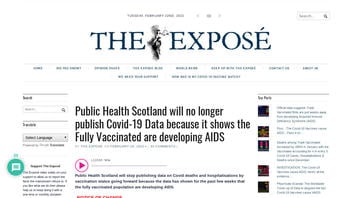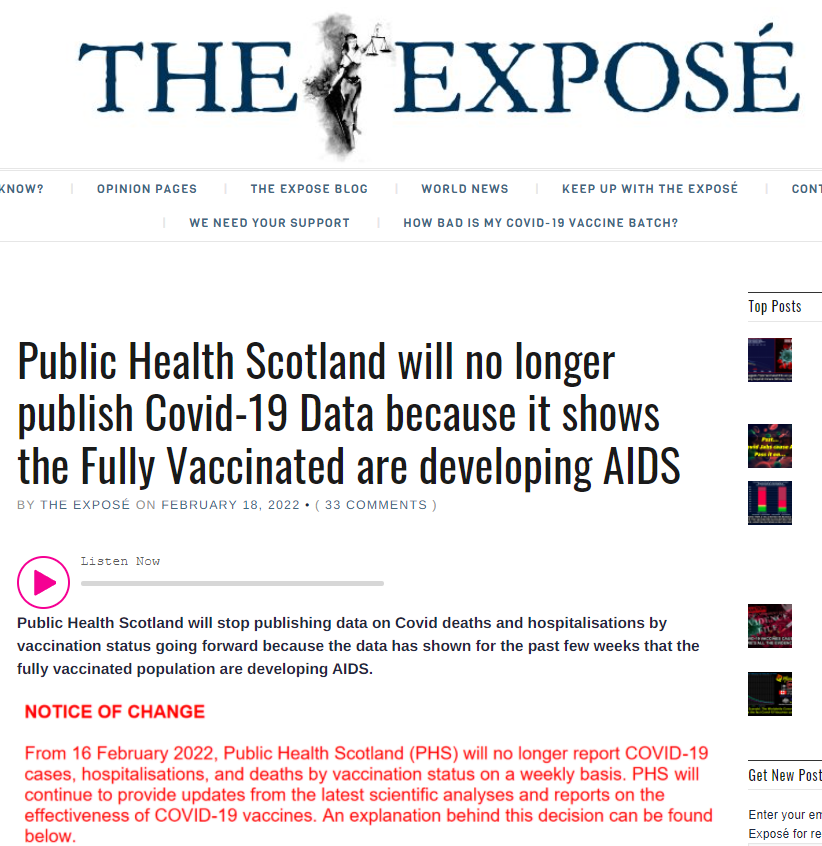
Did Public Health Scotland (PHS) stop publishing weekly COVID-19 data to hide that fully vaccinated people are developing AIDS? No, that's not true: The agency said it's because of an "increasing risk of misinterpretation." COVID skeptics and anti-vaccine activists have used PHS numbers out of context to mislead.
COVID vaccines boost the ability of our bodies to fight coronavirus. AIDS weakens our immune systems, making us more susceptible to disease.
The claim appeared in an article (archived here) published by The Exposé on February 18, 2022, under the headline "Public Health Scotland will no longer publish Covid-19 Data because it shows the Fully Vaccinated are developing AIDS." It opened:
Public Health Scotland will stop publishing data on Covid deaths and hospitalisations by vaccination status going forward because the data has shown for the past few weeks that the fully vaccinated population are developing AIDS.
This is what the article looked like on The Exposé website on February 22, 2022:
(Source: The Exposé screenshot taken on Tue Feb 22 17:23:12 2022 UTC)
The change was announced in the Public Health Scotland COVID-19 & Winter Statistical Report that was released on February 16, 2022. In the report, PHS explains its rationale for dropping the weekly updates:
Due to the increasing risk of misinterpretation from growing complexities as the COVID-19 pandemic enters its second year ... PHS has taken the decision to no longer report COVID-19 cases, hospitalisations and deaths by vaccination status on a weekly basis. PHS is currently reviewing the content and frequency of reporting this information.
Lead Stories has already debunked at least three articles by The Exposé that misrepresented or used PHS numbers in misleading ways. A similar story from The Gateway Pundit was also debunked for the same reasons.
In its "NOTICE OF CHANGE" included in the report, PHS provided the reasons the agency believes it's inappropriate to continue publishing weekly COVID case rates (emphasis PHS):
Recent changes in testing behaviour and policies, including the fact that asymptomatic people no longer need a COVID-19 PCR test, limits our ability to robustly identify and monitor COVID-19 cases by vaccination status. This means we cannot confidently compare recent case trends to historical data.
PHS continues its case later in the report:
The population of Scotland is relatively small compared to other countries such as England and the United States, and with a high vaccination rate, systematic underlying differences between the unvaccinated, partially vaccinated and booster populations become more evident sooner than bigger countries that may have a larger unvaccinated population. In Scotland most people are vaccinated and have received a booster, this results in a small number of people who are unvaccinated or have had one dose or two doses. Small increases in case numbers in a small population have a bigger impact on case rates than small increases in a larger population (e.g. boosted) where such differences are less noticeable due to the sheer number of people. Comparison of case rates is therefore inappropriate.
COVID vaccines don't cause AIDS
The Exposé article says PHS stopped publishing the weekly COVID data because fully vaccinated people are developing AIDS, but that's not possible. In a February 11, 2022, email to Lead Stories, Stuart C. Ray, M.D., professor of medicine at Johns Hopkins University School of Medicine, said people vaccinated for COVID are at no risk of getting AIDS from the shot or booster:
There is no scientific basis for even speculating that the authorized and approved vaccines to prevent COVID-19 could cause AIDS.
Charts in The Exposé article claim to show a waning immune system caused by the COVID vaccines, but that's not what they're showing at all. Instead of being a measure of "immune system performance," they're showing vaccine efficacy or vaccine effectiveness. The term "immune system performance" is not found in the 62-page report. Neither is "immunity." And "immune" only appears once.
This is how HIV.gov, an official U.S. government website managed by the U.S. Department of Health and Human Services, defines HIV and AIDS:
HIV (human immunodeficiency virus) is a virus that attacks cells that help the body fight infection, making a person more vulnerable to other infections and diseases. It is spread by contact with certain bodily fluids of a person with HIV, most commonly during unprotected sex (sex without a condom or HIV medicine to prevent or treat HIV), or through sharing injection drug equipment.
If left untreated, HIV can lead to the disease AIDS (acquired immunodeficiency syndrome). ...
AIDS is the late stage of HIV infection that occurs when the body's immune system is badly damaged because of the virus.
COVID vaccines work the opposite of HIV and AIDS, according to the Centers for Disease Control and Prevention. The shots help our bodies develop immunity to the virus that causes COVID without someone having to get the illness. They boost a person's immunity to fight disease, not weaken it.
Lead Stories previously debunked another story suggesting COVID vaccines cause AIDS.


















